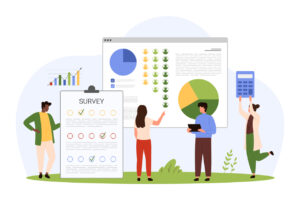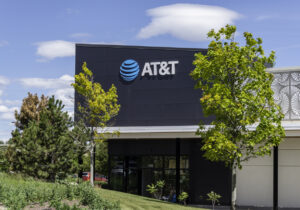What is your company’s ‘Bridgerton’?
How businesses big and small are using cultural moments to drive meaningful social change.

When a transgender employee came out to their colleagues at 8ThirtyFour Integrated Communications, in Grand Rapids, Mich., and revealed they had been turned down for an apartment because of their gender identity, the company’s founder and principal, Kim Bode, decided to act.
“It took several months of working here, and they were encouraged by other staff members to come forward,” says Bode, who employs eight people, including one other gay employee. “Because of who we are and what our culture is, we decided to fully embrace this.”
In 2020, shortly after the employee’s revelation, Bode joined Small Business 4 Equality, a coalition of West Michigan companies keen to expand the state’s Elliot-Larsen Civil Rights Act. They are demanding explicit protections for sexual orientation and gender identity in housing, education and employment.
This summer, building on the momentum of Pride Month in June, Bode plans to announce a $5,000 scholarship in partnership with Grand Valley State University’s Division of Inclusion and Equity. LGBTQ+ students will be able to apply beginning in October, with funds beings dispersed the following school year, she says.
Budgets are ‘moral documents’
As communications professionals explore how best to recognize and respond to significant cultural moments at their companies, Bode exemplifies how to identify what one’s employees care about – and what they need to feel fully seen, heard and valued. While celebrating diversity might start with a calendar – including https://www.usamulticulturalcalendar.com and the one provided by the Anti-Defamation League – organizations must develop programs and strategies to facilitate social change throughout the year.
“We need to stop telling stories without action,” says Ragan Consulting Group diversity advisor Kim Clark. “A budget is a moral document. If you’re going to allow $50,000 for cultural moments, think instead of turning that into a sponsorship or mentorship program to make employees’ careers and lives better. Want to honor women in March? Close that pay gap.”
Goldman Sachs is demonstrating leadership in that regard, says Kerry Mitchell Brown, Ph.D., who advises corporations and nonprofits on how to create anti-racist systems.
Coinciding with Women’s History Month, the investment bank on March 10 unveiled One Million Black Women in partnership with organizations led by women of color. As part of the initiative, it will commit $10 billion in direct investment capital and $100 million in philanthropic support “to address the dual disproportionate gender and racial biases that Black women have faced for generations, which have only been exacerbated by the pandemic,” according to the bank’s website.
Black history Is American history
Likewise, organizations should not limit their focus on Black empowerment to Black History Month, Brown says. Juneteenth, which is observed June 19, provides another opportunity to demonstrate ongoing commitment to racial justice. Also known as Freedom Day, Juneteenth celebrates the emancipation of slaves.
“I would treat it as Martin Luther King Day,” Brown says. “Give people the space to have the time off to explore and to learn. Is there some reckoning that an organization might need to do? Is there a particular industry that might have been a perpetrator of injustice? It’s an opportunity to really engage in Black history – in all of American history.”
At ad agency McKinney, Juneteenth is a paid holiday for 170 employees in Durham, New York and Los Angeles. Last fall – as the world was reeling from the murder of George Floyd – McKinney joined the #CommitToChange movement initiated by 600 & Rising, a nonprofit promoting Black talent in advertising and PR. McKinney hosted How Young, Gifted Black Creatives Can Break Into Advertising, while CEO Joe Maglio penned an open letter on his company’s website with charts depicting his own company’s lack of diversity.
At the time, Maglio pledged to hire the company’s first executive director of diversity, equity and inclusion.
Her name is Chandra Guinn, and she started seven weeks ago.
Empathy leads to equity
“The leadership centers empathy – that is a practice,” says Guinn, former director of the Mary Lou Williams Center for Black Culture at Duke University. “In order to be authentic in your engagement with others, particularly when you do not share the same identity markers, then you must draw upon what you do share in common, and the practice of empathy to guide your decision-making.”
When it comes to celebrating cultural moments, McKinney has been on a journey of doing so for quite some time, Guinn says. In her new role, she wants to put DE&I at the heart of every decision the agency makes.
“Some are at the place of appreciating the how. Then there are the folks who are at the place of the what,” she says. “We will collectively move to the place where we can articulate the why. That undergirds the how and the what.”
Embracing diversity is the right thing to do, but it’s also good for business. Acknowledging the purchasing power of Black women, Guinn says: “We have the capacity to produce campaigns and materials that help our clients offer their goods and service to the diversity of people.”
For her part, Clark hopes companies will consider Netflix as an example of how to make and market products that embrace racial equity. In just four weeks, “Bridgerton,” Shonda Rhimes’ British period piece co-starring Golda Rosheuvel, who is Black and gay, and Regé-Jean Page, who identifies as mixed-race, was watched by 82 million households around the world, becoming the streaming service’s most successful original series of all time.
“Netflix is leading the way,” says Clark, who praises the company’s new vice president of inclusion, Vernā Myers, as an industry trailblazer. “If she’s able to move the needle at a fast-paced and competitive environment like that, it tells me it can be done in any corporate environment.”
Contact Kristin Hart at Kristin.Hart@raganconsulting.com to learn how Ragan Consulting Group can help improve your communications strategy. Follow RCG on LinkedIn here.







Fighting for rights and being informed on what rates of being a friend on it’s always important and standing behind our neighbors are community